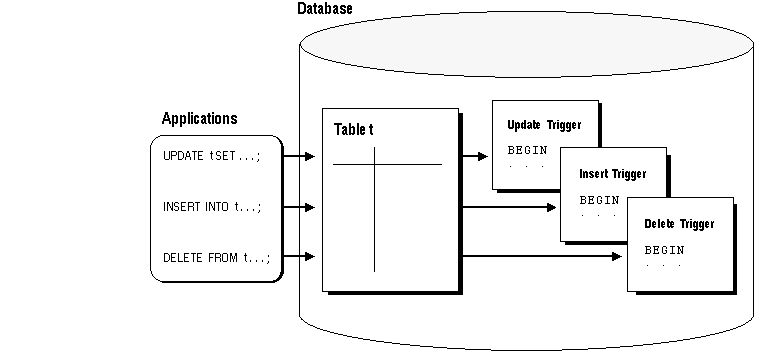-
1. Overview
A trigger is a stored procedure in a database that automatically invokes whenever a special event in the database occurs. For example, a trigger can be invoked when a row is inserted into a specified table or when certain table columns are being updated.

2. Description
2.1 Usages
- automatically generate derived column values
- prevent invalid transactions
- enforce complex security authorizations
- enforce referential integrity across nodes in a distributed database
- enforce complex business rules
- provide transparent event logging
- provide sophisticated auditing
- maintain synchronous table replicates
- gather statistics on table access
2.2 Pros
- Triggers can be used as an alternative method for implementing referential integrity constraints.
- By using triggers, business rules and transactions are easy to store in database and can be used consistently even if there are future updates to the database.
- It controls on which updates are allowed in a database.
- When a change happens in a database a trigger can adjust the change to the entire database.
- Triggers are used for calling stored procedures.
2.3 Cons
- Triggers execute invisible to client-application application. They are not visible or can be traced in debugging code.
- It is hard to follow their logic as it they can be fired before or after the database insert/update happens.
- It is easy to forget about triggers and if there is no documentation it will be difficult to figure out for new developers for their existence.
- Triggers run every time when the database fields are updated and it is overhead on system. It makes system run slower.
3. Reference
https://docs.oracle.com/cd/A57673_01/DOC/server/doc/SCN73/ch15.htm
https://www.geeksforgeeks.org/sql-trigger-student-database/
https://www.quora.com/What-are-the-advantages-and-disadvantages-of-using-Database-Triggers
'DB > RDB' 카테고리의 다른 글
PostgreSQL (0) 2020.04.10 Database Cursor (0) 2020.02.24 S3, Block storage, File storage, and Object storage (0) 2020.02.24 DDL, DML, DCL, and TCL (0) 2020.02.23 Clustered and Non clustered index (0) 2020.02.23